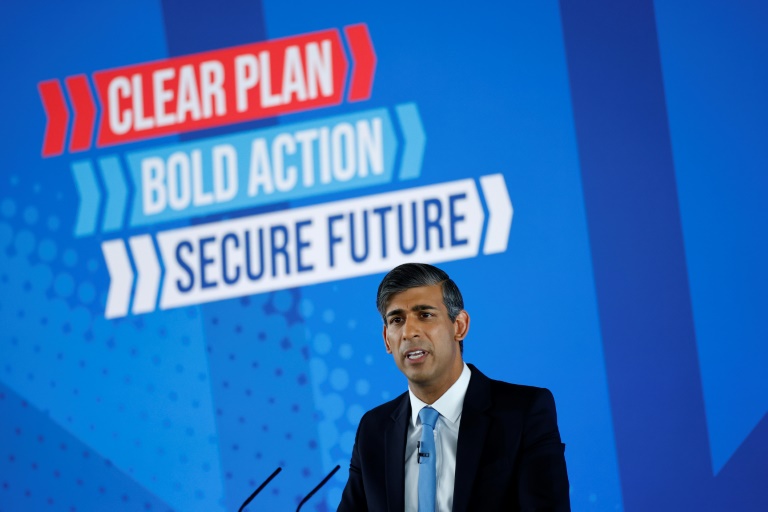UK economy stagnates heading into general election

British Prime Minister Rishi Sunak’s Conservatives trail in polls ahead of the election – Copyright GETTY IMAGES NORTH AMERICA/AFP/File MARIO TAMA
Ben PERRY
Britain’s economy stagnated in April after emerging from recession in the first quarter of the year, official data showed Wednesday, dealing a setback to Prime Minister Rishi Sunak ahead of next month’s general election.
The zero growth in April followed an expansion of 0.4 percent in March, according to the Office for National Statistics.
Britain votes on July 4 in an election widely expected to be won by the main opposition Labour party, a victory that would end 14 years of rule by Conservatives, who have been led by Sunak since 2022.
“There is more to do, but the economy is turning a corner and inflation is back down to normal,” finance minister Jeremy Hunt said in reaction to Wednesday’s data.
The Conservatives would “keep the economy growing with our clear plan to cut taxes on work, homes and pensions”, he added.
The Labour party of Keir Starmer seized on the data to savage the economic record of the Tories.
The “figures expose the damage done after 14 years of Conservative chaos”, said Labour’s finance spokesperson, Rachel Reeves
Britain had emerged from a short-lived recession with growth in the first quarter of this year.
The UK economy contracted slightly for two quarters in a row in the second half of 2023, meeting the technical definition of a recession that was caused by elevated inflation that has prolonged a cost-of-living crisis.
“The stagnation in GDP in April doesn’t mean the economic recovery has been extinguished, but it’s hardly great news for the prime minister three weeks ahead of the election,” noted Paul Dales, chief UK economist at Capital Economics research group.
– ‘Economic tailwind’ –
Looking to close the gap on Labour, Sunak on Tuesday promised voters tax cuts and lower immigration as he launched his party’s manifesto.
Sunak said his government would pay for lower taxes by cracking down on welfare payments to working-age recipients.
It came as official data Tuesday revealed a rise in British unemployment amid elevated earnings growth.
A breakdown of April’s output data showed services grew 0.2 percent, while production slid 0.9 percent and construction shed 1.4 percent.
With the UK experiencing a rainy April, last month’s “lack of growth should come as no surprise”, said Danni Hewson, head of financial analysis at AJ Bell.
“Builders shunned roof tops and shoppers deserted… (shopping) streets in favour of their warm, dry sofas.”
Next week sees the release of official inflation data for May along with a regular Bank of England meeting where the BoE is expected to keep its main interest rate at a 16-year high.
“Despite the stalling of the recovery in April, the dual drags on economic growth from higher interest rates and higher inflation will continue to fade throughout the year,” Dales said.
“That will generate a bit of an economic tailwind for the next government.”
UK economy stagnates heading into general election
#economy #stagnates #heading #general #election





